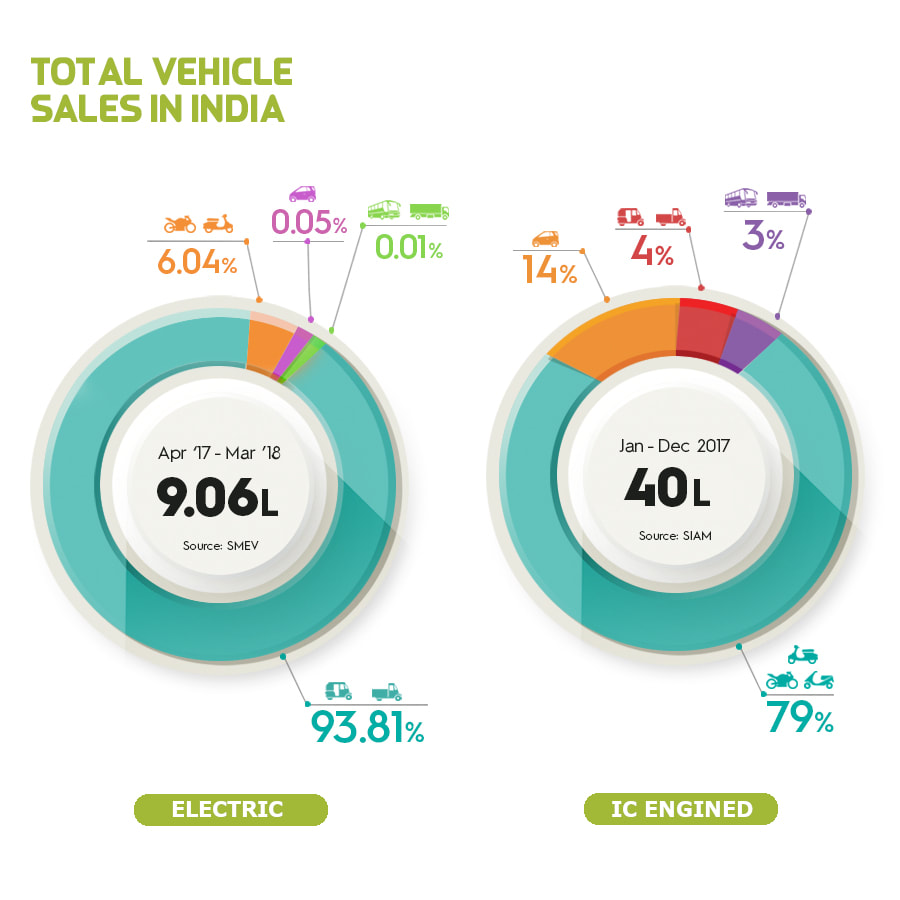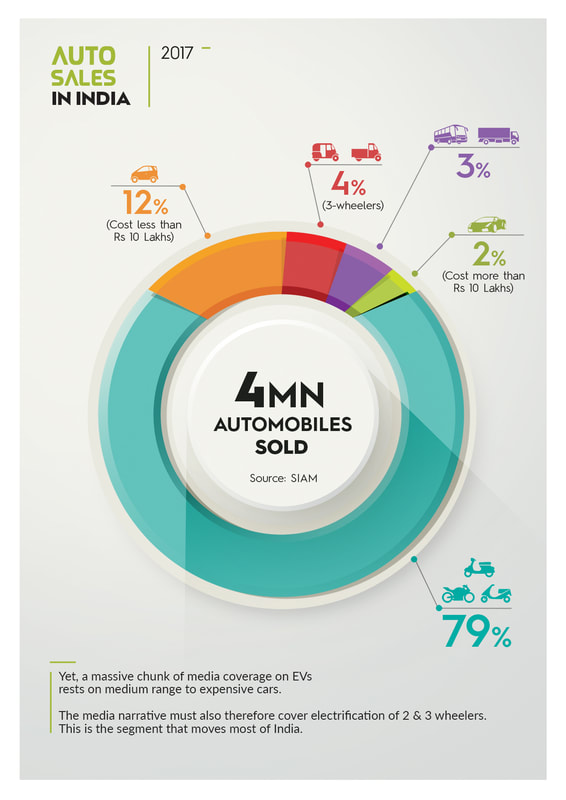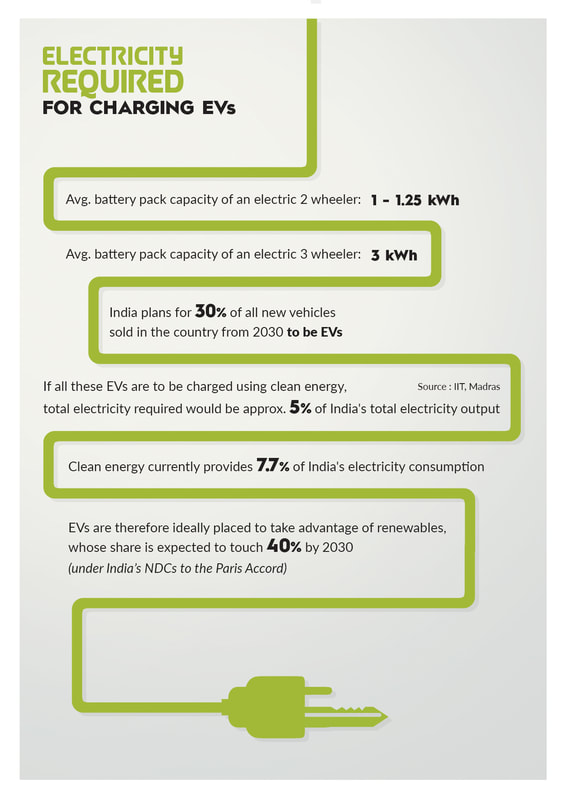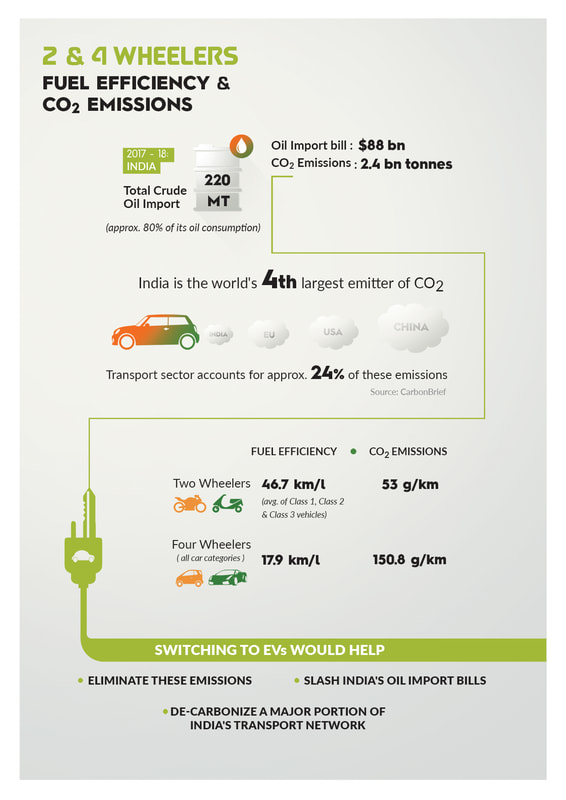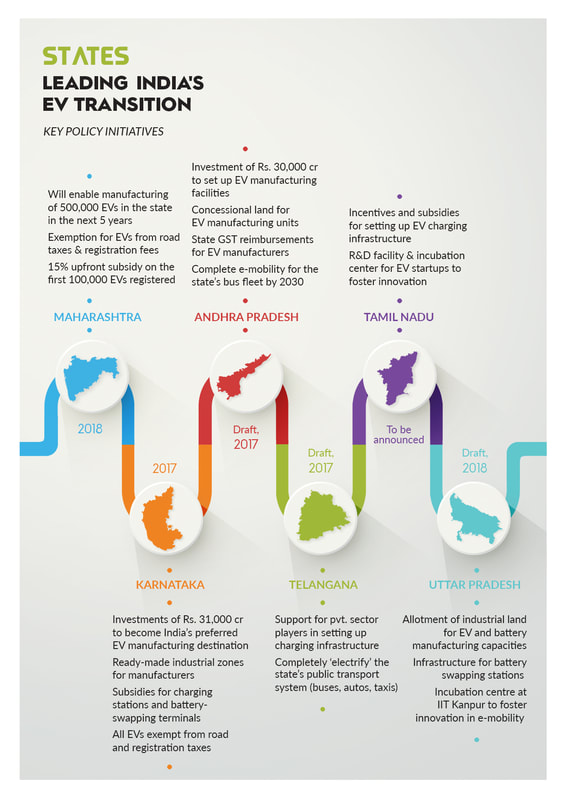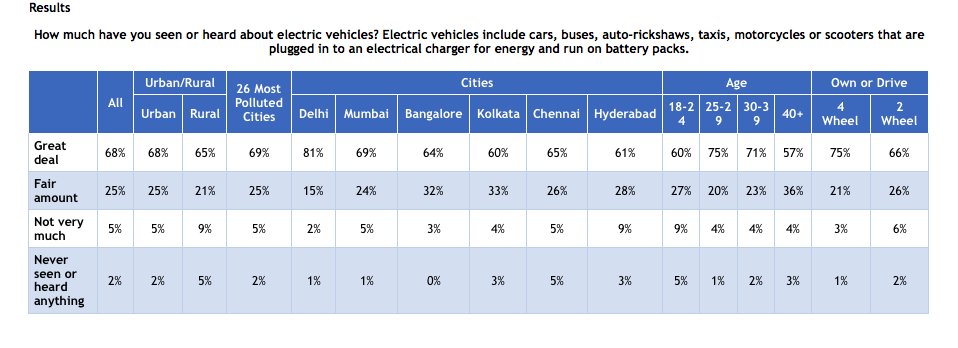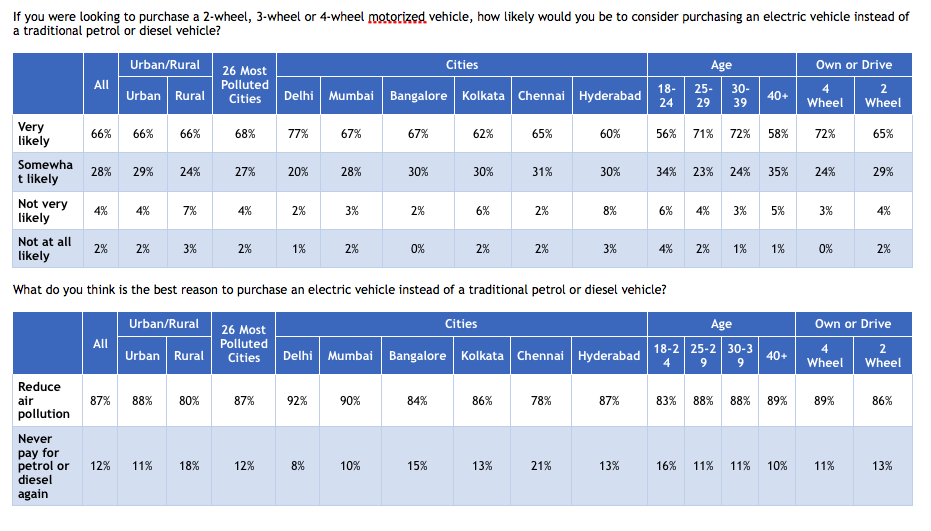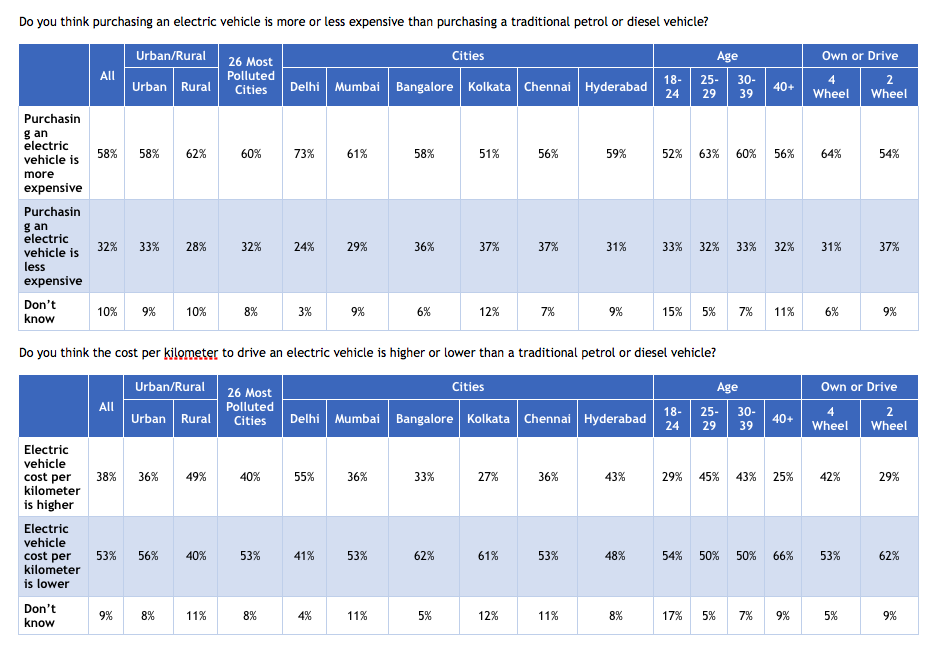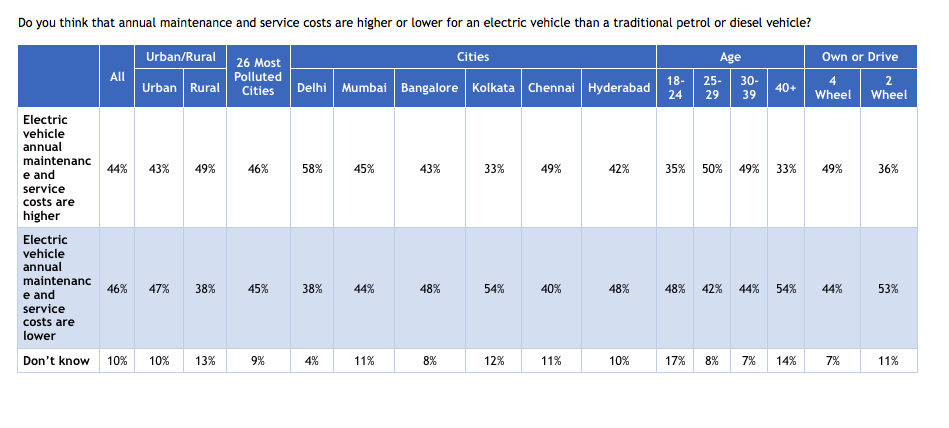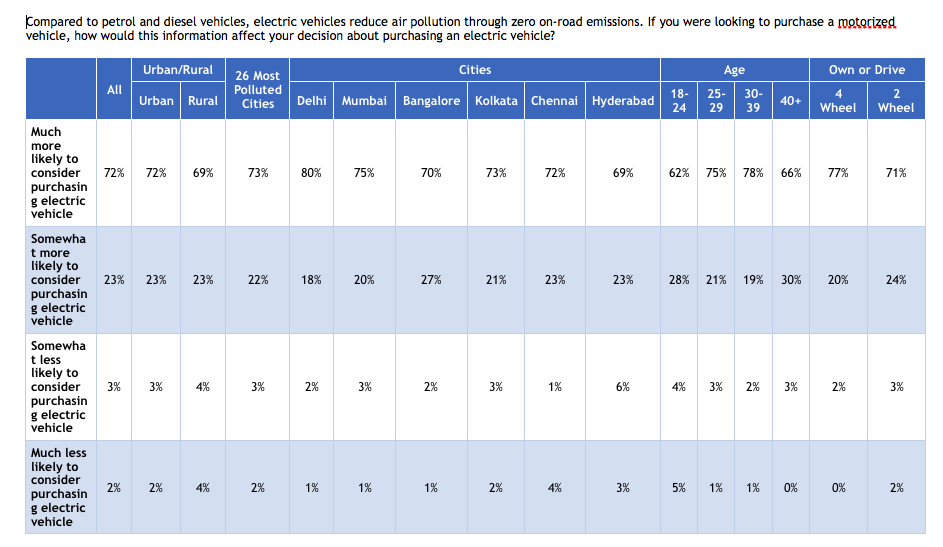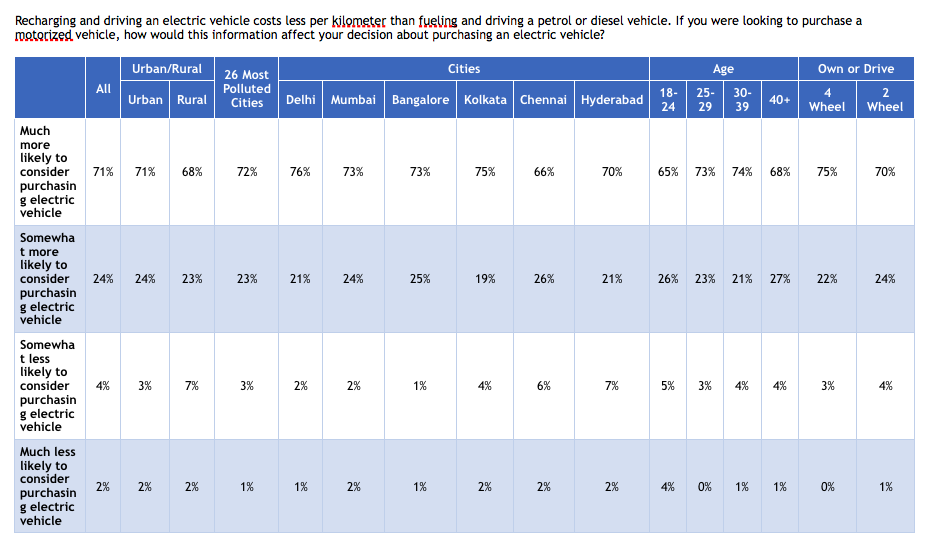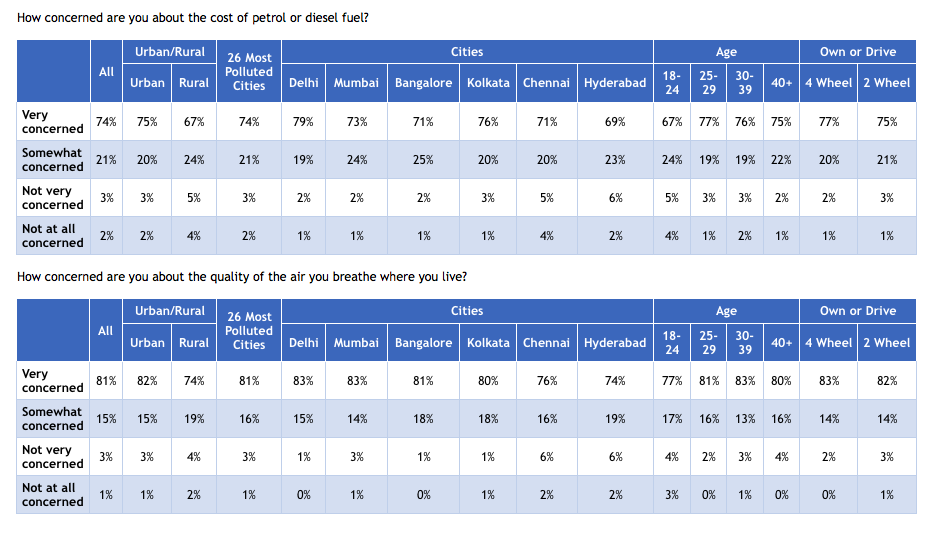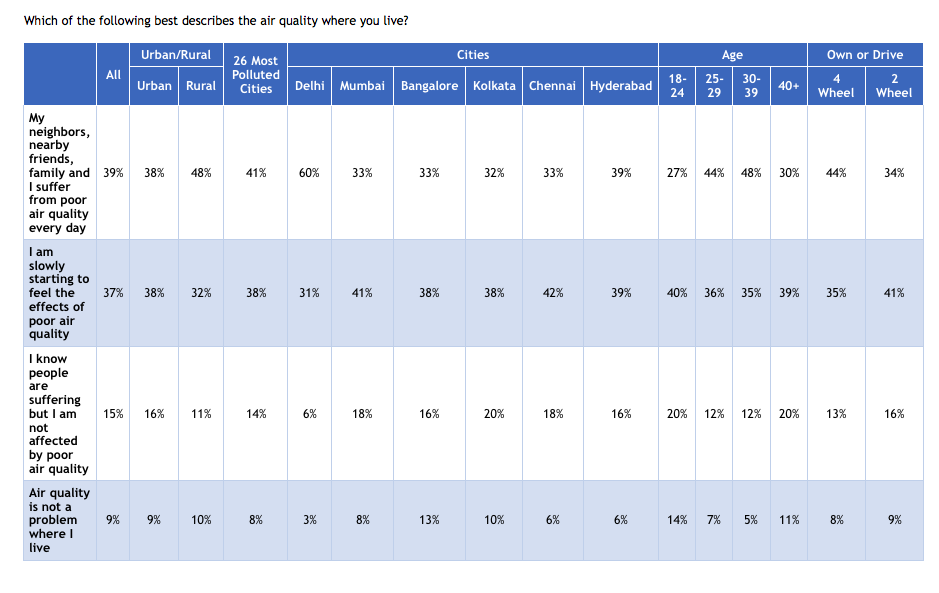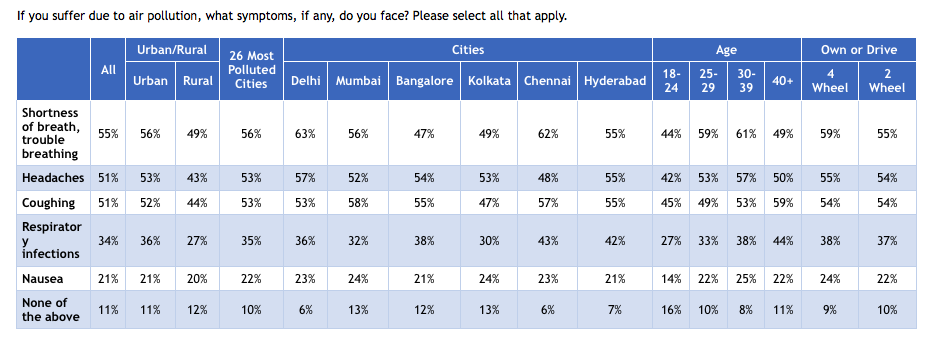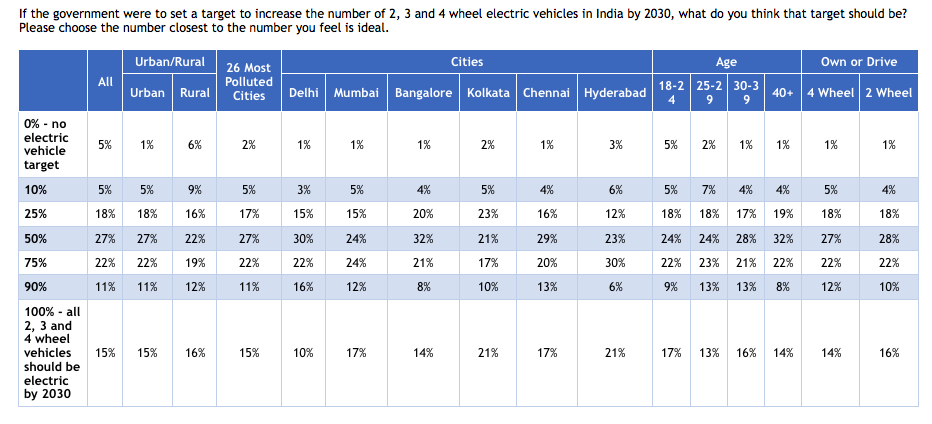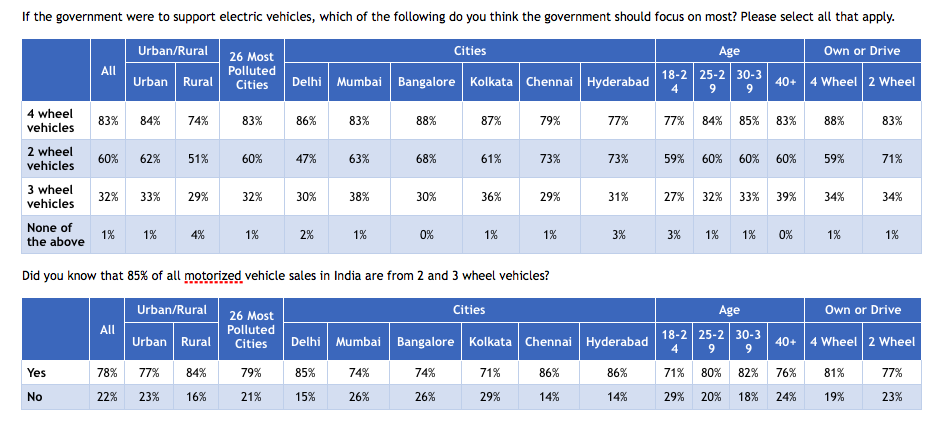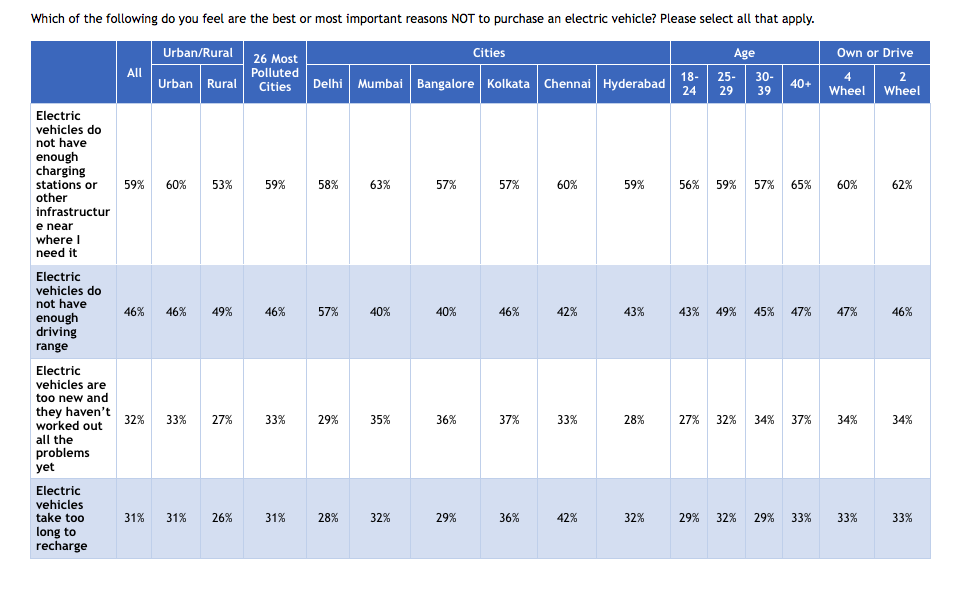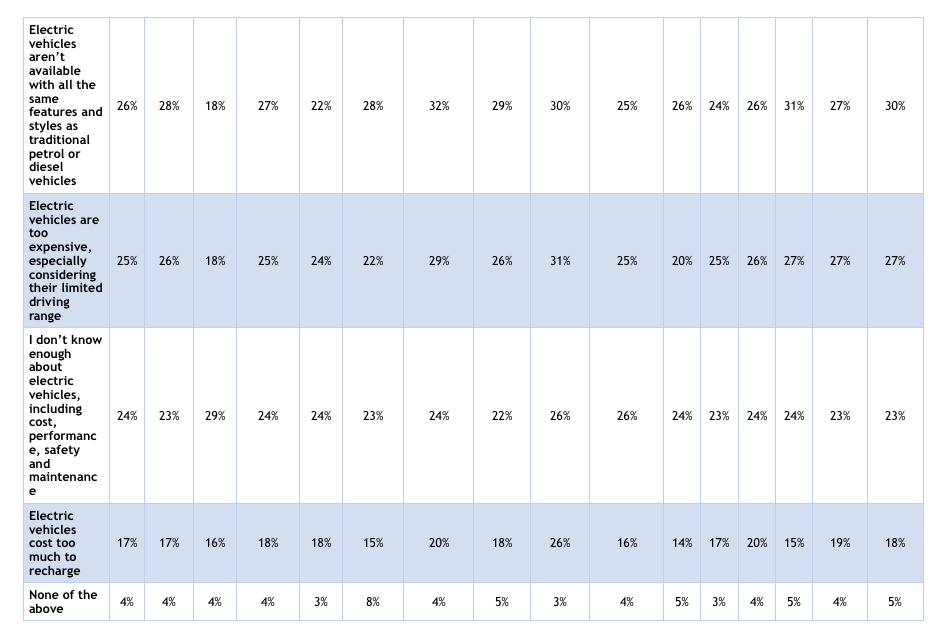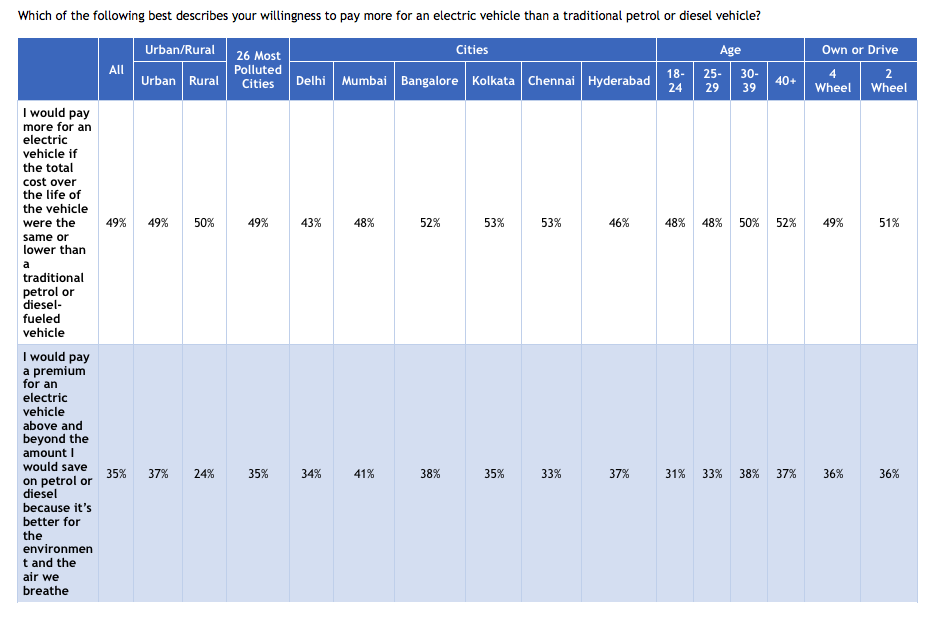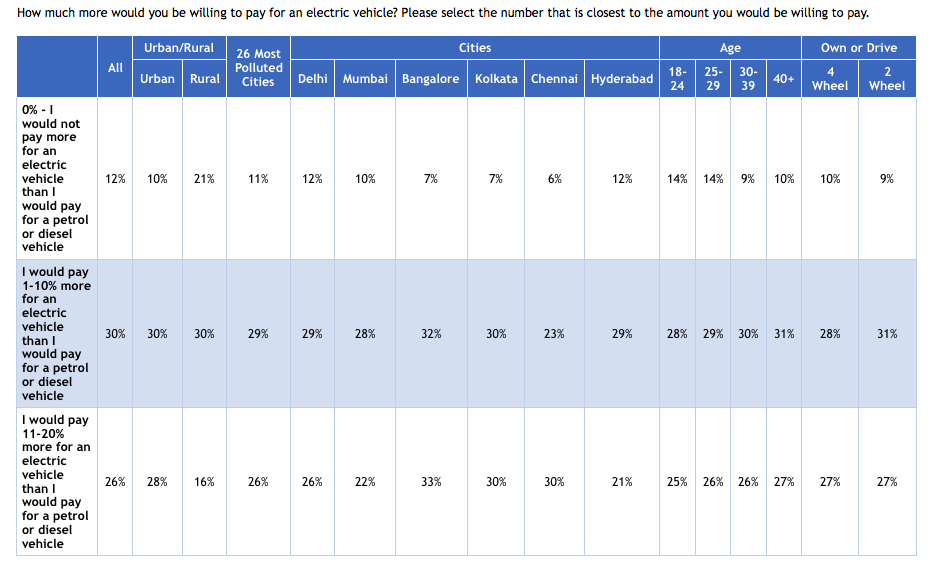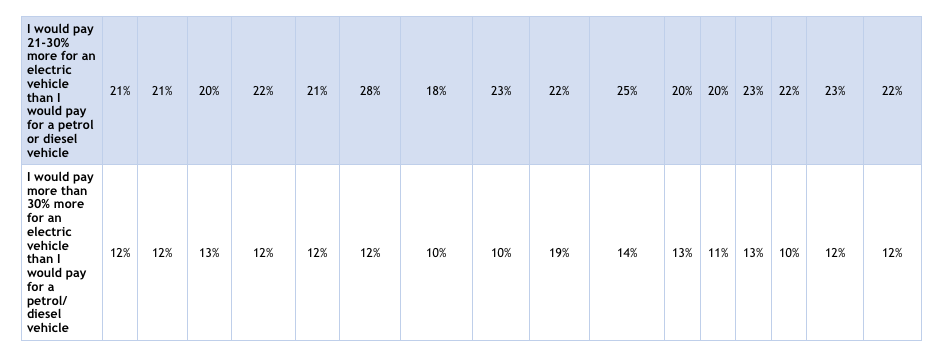75% of respondents support a target of at least 50% of all vehicles in India to be electric by 2030.
The survey revealed that most drivers and vehicle owners are personally affected by poor air quality. 76% say they – along with their neighbours, friends or family - suffer from poor air quality every day or are starting to show symptoms of being affected by air pollution. Delhi seemed to be worst affected with 91% of its respondents said they or someone they knew were suffering from poor air quality. Similarly, high percentages were recorded in Hyderabad (78%), Chennai (75%), Mumbai (74%), Bangalore (71%), and Kolkata (70%).
India is the third largest market for automobiles and the world’s largest market when it comes to two-wheelers. Over 4 million internal combustion engine vehicles were sold in India in 2017, and 81% of those sales (20 million units) came from the 2-wheeler segment alone. In comparison, according to data from Society of Manufacturers of Electric Vehicles (SMEV), less than a million electric vehicles were sold in India, from which 93% were electric 3-wheelers.
- Drivers and vehicle owners have heard a ‘great deal’ about electric vehicles (68%), especially in Delhi (81%).
- Drivers and vehicle owners are ‘very likely’ to consider purchasing an electric vehicle (66%), especially in Delhi (77%).
- By a wide margin, drivers and vehicle owners say that ‘reducing air pollution’ (87%) is the best reason to purchase an electric vehicle, not because they will ‘never pay for petrol or diesel again’ (12%).
- Drivers and vehicle owners say that the cost of purchasing an electric vehicle is higher (58%) than the cost of purchasing a traditional petrol or diesel vehicle (32%). This is especially true in Delhi where 73% say the cost of purchasing an electric vehicle is higher and least true in Kolkata where 51% say the cost of purchasing an electric vehicle is higher.
- Drivers and vehicle owners say that the cost per kilometer to drive an electric vehicle is less than the cost of a petrol or diesel vehicle (53%).
- Drivers and vehicle owners don’t know whether the annual maintenance and service costs for electric vehicles are higher (44%) or lower (46%) than a petrol or diesel vehicle.
- Drivers and vehicle owners say that electric vehicles have a longer usable life (68%) than petrol or diesel vehicles (24%).
- Drivers and vehicle owners say they are ‘much more likely’ to consider purchasing an electric vehicle after learning that ‘electric vehicles reduce air pollution through zero on-road emissions’ (72%) and after learning that ‘recharging and driving an electric vehicle costs less per kilometer than fueling and driving a petrol or diesel vehicle’ (71%).
- Drivers and vehicle owners are ‘very concerned’ (74%) about the cost of petrol or diesel fuel. The proportion who are ‘very concerned’ is highest in Delhi (79%) and lowest in Hyderabad (69%) and among 18-24 year-olds (67%). The proportion who are ‘very concerned’ is roughly equal among 4-wheel drivers (77%) and 2-wheel drivers (75%).
- Drivers and vehicle owners are even more concerned about air quality than they are about the cost of petrol or diesel fuel. 81% are ‘very concerned’ about the air they breathe compared with 74% who are ‘very concerned’ about the cost of petrol or diesel fuel. Drivers and vehicle owners in every category (urban, rural, young, middle-aged, 2-wheel, 4-wheel) are more concerned about the air they breathe than they are about the cost of petrol or diesel fuel.
- Most drivers and vehicle owners are personally affected by poor air quality. 76% say ‘my neighbors, nearby family, friends and I suffer from poor air quality every day’ (39%) or ‘I am slowly starting to feel the effects of poor air quality (37%). In Delhi, 91% say ‘my neighbors, nearby family, friends and I suffer from poor air quality every day’ (60%) or ‘I am slowly starting to feel the effects of poor air quality (31%).
- The most common symptoms are ‘shortness of breath, trouble breathing’ (55%), headaches (51%) and coughing (51%). These symptoms are more common in Delhi and urban areas and less common among 18-24 year-olds and in rural areas.
- 75% of drivers and vehicle owners say that the government should set a target that at least 50% of all 2, 3 and 4 wheel vehicles should be electric by 2030.
- Drivers and owners of 2 wheel vehicles and 4 wheel vehicles agree that the government should prioritize 4 wheel electric vehicles first and 2 wheel electric vehicles second. 83% of all drivers and vehicle owners say that the government should prioritize 4 wheel electric vehicles, 60% say the government should prioritize 2 wheel electric vehicles and 32% say the government should prioritize 3 wheel electric vehicles.
- The biggest objections to electric vehicles are :
- Electric vehicles do not have enough charging stations or other infrastructure near where I need it (59%)
- Electric vehicles do not have enough driving range (46%)
- Electric vehicles are too new and they haven’t worked out all the problems yet (32%)
- Electric vehicles take too long to recharge (31%)
- Electric vehicles aren’t available with all the same features and styles as traditional petrol or diesel vehicles (26%)
- Electric vehicles are too expensive, especially considering their limited driving range (25%)
- I don’t know enough about electric vehicles, including cost, performance, safety and maintenance (24%)
- Electric vehicles cost too much to recharge (17%)
- 49% of drivers and vehicle owners say they would pay more for an electric vehicle than a petrol or diesel vehicle IF the total cost over the life of the electric vehicle were the same or lower than a petrol or diesel vehicle. 35% say they would pay a premium for an electric vehicle because it’s better for the environment and the air we breathe while 15% are not interested in owning or purchasing an electric vehicle.
- 59% of drivers and vehicle owners would pay at least 11% more for an electric vehicle than a petrol or diesel vehicle.
About Climate Trends: Climate Trends LLP is a media strategy initiative focusing on building public understanding and reportage of climate change, environment and clean energy issues. We help organisations, think tanks and start-ups to achieve their communication goals on climate change and clean energy campaigns. We identify gaps and opportunities on the road to low carbon pathways and work towards creating a media discourse focused on solutions to climate change.
About FourthLion Technologies: FourthLion Technologies is India’s leading provider of public opinion polling including its proprietary instaVaani polling platform. FourthLion has conducted more than 1 million telephone, online and in person surveys with Indian voters and citizens and has published findings in leading publications such as India Today and Mint.
Contact
Aniruddha Bhattacharjee, +919560312658, [email protected]
Hozefa Merchant, +919819592410, [email protected]
Andrew Claster, FourthLion Technologies, [email protected]
Quotes
Anil Srivastava, DG-DMEO and Advisor to Niti Aayog,
"100pc EV by 2030 is too far, it will happen much sooner. 70pc entrenchment of 2 and 3 wheelers will be electric in next few years. Two wheelers contribute to at least 25 pc of pollution. India needs to handle mobility issues differently. The writing is on the wall, Morgan Stanley report predicts India to be ahead of China in EV penetration and shared mobility."
Prof Ashok Jhunjhunwala, IIT, Madras, Principal Advisor to Ministry of Railways
"Our ever crowded cities, rising import bills, and worsening air pollution are the three main reasons that India needs to improve its mobility. A push to public transport will help achieve tremendous benefits on each of these. We should start with three wheelers, two wheelers and buses. Shift any shared vehicle to electric. That will bring about a change. Cars will happen on their own as we go along but primary task is to electrify public transport.
Electric three wheelers will be launched in Mohali next month and within a year from now, we hope that electric three wheelers will get take off in over a hundred Indian cities."
Kedar Soman, PluginIndia
"What is interesting to are very high numbers of people who state that they are affected by pollution and consider switching to electric vehicle with worsening pollution in mind. These numbers strongly resonate with the sentiment we see on ground in formal and informal settings. Many people realize that if they have a vehicle that can go 300 km and takes 3 minutes to refill, but if they don't have clean air to breathe, that's not really a convenience.
This makes a strong case for a broader effort on public education on electric vehicles. We don't need awareness, it's there now. Now we need education to get enough people to switch to EVs that it will build necessary critical mass for catalysing mass change. Policy needs to focus on not only economics but education as well."
Andrew Claster, FourthLion Technologies
"The survey demonstrates that Indians are literally sick and tired of breathing air that makes them ill. Indians are ready for electric vehicles and they want their government to take the lead by setting a target that at least 50% of vehicles must be electric by 2030."
Anand Mahindra, Chairman, Mahindra Group
"Since we invested in the technology we have often been told that we were making a big mistake betting on battery powered vehicles. And today with the world transitioning to the new normal, we are recognized as pioneers in electric vehicles and look forward to making India an economy powered by electric mobility."

